[ 9/11 Books Page 2 ] [ Post-9/11 Books ] [ Post-9/11 Books 2 ]
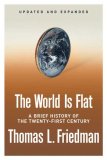 |
Conservatives Without Conscienceby John Dean |
|
The World Is Flat is Thomas L. Friedman’s account of the great changes taking place in our time, as lightning-swift advances in technology and communications put people all over the globe in touch as never before—creating an explosion of wealth in India and China, and challenging the rest of us to run even faster just to stay in place. This updated and expanded edition features more than a hundred pages of fresh reporting and commentary, drawn from Friedman’s travels around the world and across the American heartland—from anyplace where the flattening of the world is being felt. |
|
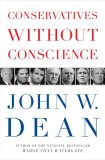 |
The World Is Flat: A Brief History of the Twenty-first Centuryby Thomas L. Friedman |
|
In his seventh book, Dean, the former Nixon legal counsel whom the FBI has called the "master manipulator" of the Watergate cover-up, weighs in with a rebuke to Christian fundamentalists and other right-wing hard-liners. A self-described Goldwater conservative (indeed, Goldwater had planned to collaborate on this book before his death), he rails against the influence of social conservatives and neoconservatives within his party. Suffused with bitterness stemming from the controversies in which he has been embroiled, Dean's book paints a thin social science veneer over a litany of mostly ad hominem complaints. Purporting to show that social conservatives and neoconservatives are, on the whole, demonstrably authoritarian, bigoted, irrational and amoral, Conservatives Without Conscience offers helpful hints such as "Conservatives without conscience do not have horns and tails," and evinces a telling fascination with politicians' shady book deals. Though there is clearly much to condemn in the policies and tactics Dean deplores, assailing everyone from French political theorist Joseph de Maistre to Senate Majority Leader Bill Frist to the chairman of Yale University's conservative association as "Double High" social- dominance-oriented authoritarians undermines his journalistic credibility. Dean's lurid accusations may be entertaining, but they add little to the reasoned debate that Washington so sorely lacks today. |
|
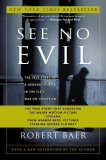 |
See No Evil: The True Story of a Ground Soldier in the CIA's War on Terrorismby Robert Baer |
|
Although the author/narrator lacks a trained voice, his muttered, sometimes hesitant speech makes him more believable as an intelligence-gatherer--trained more to listen than to talk. Robert Baer's abridged work leaps by place and time, illuminating the CIA field officer's career from recruitment to retirement, with lots of detailed recollections culled from twenty years of clandestine Middle Eastern operations. Due to government censorship of the manuscript, the reader must interject, "words blacked out" at the most annoying times. However, the stuff that does slip through gives ample detail of how these guys bribe, steal, intoxicate, and deceive to gain vital information. |
|
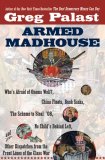 |
Armed Madhouseby Greg Palast |
|
Palast (The Best Democracy Money can Buy) is a refreshing, fearless witness to the American political landscape-and he doesn't really care whether or not you like him for it: "I am not a nice man. You want something heartwarming ... buy a puppy." Though Palast comes right out and calls George Bush II un-American ("'Greg, you have no respect for the office of the President.' No, I don't. Not one iota."), the author is not another TV or radio personality with an axe to grind. A former corporate fraud and racketeering investigator, Palast is an economist and investigative journalist, and his arguments are based on research and fact. At once scary, infuriating, fascinating and frustrating, this book covers almost all the controversial political territory of the new century (see the subtitle), including Hurricane Katrina. |
|
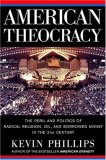 |
American Theocracy: The Peril and Politics of Radical Religion, Oil, and Borrowed Money in the 21stCenturyby Kevin Phillips |
|
Few political strategists have relied so extensively on history to understand the American political system as Kevin Phillips. Often identified as a former Republican strategist, Phillips has made a career of charting his disillusion with the GOP in books such as American Dynasty, a blistering look at the Bush family. His latest, American Theocracy, continues this scrutiny -- with mixed results. |
|
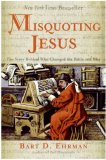 |
Misquoting Jesus: The Story Behind Who Changed the Bible and Whyby Bart D. Ehrman |
|
The popular perception of the Bible as a divinely perfect book receives scant support from Ehrman, who sees in Holy Writ ample evidence of human fallibility and ecclesiastical politics. Though himself schooled in evangelical literalism, Ehrman has come to regard his earlier faith in the inerrant inspiration of the Bible as misguided, given that the original texts have disappeared and that the extant texts available do not agree with one another. Most of the textual discrepancies, Ehrman acknowledges, matter little, but some do profoundly affect religious doctrine. To assess how ignorant or theologically manipulative scribes may have changed the biblical text, modern scholars have developed procedures for comparing diverging texts. And in language accessible to nonspecialists, Ehrman explains these procedures and their results. He further explains why textual criticism has frequently sparked intense controversy, especially among scripture-alone Protestants. In discounting not only the authenticity of existing manuscripts but also the inspiration of the original writers, Ehrman will deeply divide his readers. Although he addresses a popular audience, he undercuts the very religious attitudes that have made the Bible a popular book. Still, this is a useful overview for biblical history collections. |
|
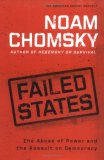 |
Failed States: The Abuse of Power and the Assault on Democracyby Noam Chomsky |
|
Forget Iraq and Sudan--America is the foremost failed state, argues the latest polemic from America's most controversial Left intellectual. Chomsky (Imperial Ambitions) contends the U.S. government wallows in lawless military aggression (the Iraq war is merely the latest example); ignores public opinion on everything from global warming to social spending and foreign policy; and jeopardizes domestic security by under-funding homeland defense in favor of tax cuts for the rich and by provoking hatred and instability abroad that may lead to terrorist blowback or nuclear conflict. Ranging haphazardly from the Seminole War forward, Chomsky's jeremiad views American interventionism as a pageant of imperialist power-plays motivated by crass business interests. Disdaining euphemisms, he denounces American "terror" and "war crimes," castigates the public-bamboozling "government-media propaganda campaign" and floats comparisons to Mongols and Nazis. Chomsky's fans will love it, but even mainstream critics are catching up to the substance of his take on Bush Administration policies; meanwhile his uncompromising moral sensibility, icy logic and withering sarcasm remain in a class by themselves. Required reading for every thoughtful citizen. |
|
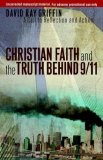 |
Christian Faith and the Truth Behind 9/11: A Call to Reflection and Actionby David Ray Griffin |
|
Probing disturbing questions that beg for a response from the Christian community, distinguished scholar of religion and popular writer David Ray Griffin provides a hard-hitting analysis of the official accounts of the events of September 11, 2001. A tireless investigator, Griffin has sorted through enormous amounts of government and independent data and brought to the surface some very unsettling inconsistencies about what really happened. In this, his latest book, he analyzes the evidence about 9/11 and then explores a distinctively Christian perspective on these issues, taking seriously what we know about Jesus’ life, death, and teachings. Drawing a parallel between the Roman Empire of antiquity and the American Empire of today, he applies Jesus’ teachings to the current political administration, and he explores how Christian churches, as a community intending to be an incarnation of the divine, can and should respond. |